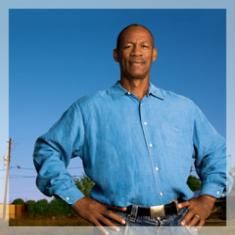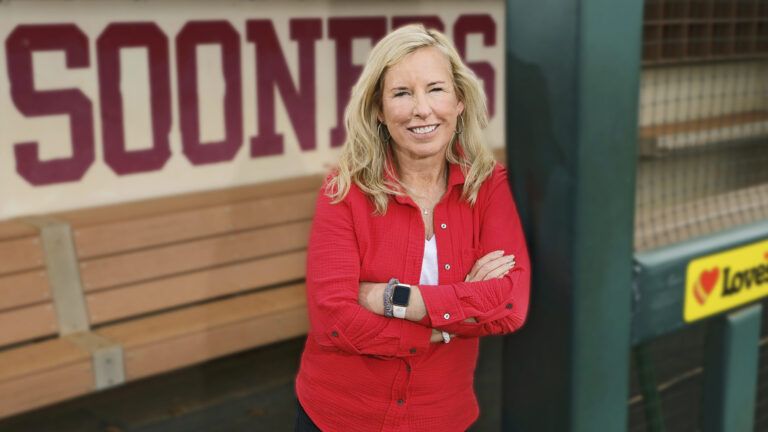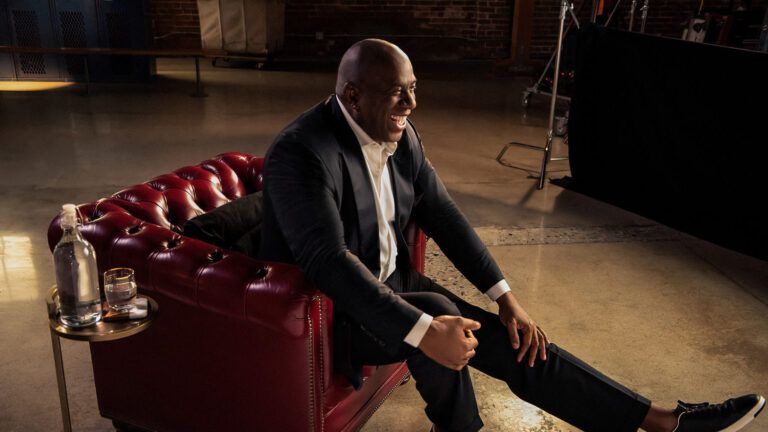There they were. Same place, same kids. Every day. Young toughs hanging out on a basketball court in Houston’s gang-ridden southwest side. Purposeless. Just waiting for an excuse to start trouble. I have to tell you, it took me back.
I nudged my friend Mike, a middle-school teacher, braked and rolled down the window of my Toyota Land Cruiser. “Hey,” I called, “I want to talk to you.” The boys scattered. One of the kids shouted, “5-0,” street slang for cop.
I had to laugh. Me, Roynell Young, a onetime wannabe delinquent from the mean streets of New Orleans, mistaken for the law. That’s certainly not how most folks know me.
For nine seasons I was an All-Pro cornerback for the Philadelphia Eagles and a model citizen. But I’ve never been one to run from my past.
Looking back on it, my making it to the NFL—making it at all—was something very close to a miracle. An act of faith from a line of people who went out of their way to rescue me from myself. And maybe that’s why Mike and I were cruising Houston’s tough streets today.
I grew up in New Orleans’s Uptown section, the third of six kids in a solid home. It wasn’t my parents’ fault I started hanging out on the street. In my neighborhood this was a boy’s rite of passage.
I was about 12 the first time a guy from the neighborhood tried to turn me around. My friend T. C. and I had sold some illegal fireworks, and we got caught. All the neighbors gathered as the cops tossed us in a squad car. I was pretty scared.
But looking at the stunned faces of the people on the street, I puffed up, wanting to give the appearance of being arrogant, in control. I’m one bad dude, I thought, and they all know it.
Till one really tough cat named Smooth stuck his head in the window. Smooth was a community leader, a guy we all knew and respected. He was tall and imposing, definitely not a man to be trifled with.
Smooth gave me a hard look. “I’ll be responsible for these boys,” he told the cops. “I guarantee they won’t get into anymore trouble.” I climbed out of the patrol car, still feeling the episode had been good for my rep—till I felt someone grab my ear. “Ow,” I howled. Smooth had turned me over to my grandma.
You’d think that would have cured me of being a tough guy. It didn’t. By high school I was a star on the football team. Livin’ large. Senior year, I was named a team captain. Worst thing that could have happened to me. My head swelled up bigger than my helmet.
One day our all-black team boarded a bus to play an all-white team in Bogalusa, Louisiana. Coach Audrict had ordered us to wear suits and ties. “I want you guys to show up in that city with a sense of pride and purpose,” he said. “I want them looking at you with respect.”
Suits? He was the coach, but I was the captain. Later I gathered the team together. “We’ll send a message, all right,” I announced. “We’ll send it our own way.” The guys knew better than to challenge me.
We boarded the bus wearing our leather and gold chains. Coach Audrict pulled me aside. He looked down for a moment. When he raised his head, he had tears in his eyes. “I’m disappointed in you, Roy. You’re a leader and I expected more of you.” No man had ever cried over me before.
Leader, it was true. But what kind of leader? For the first time an unformed question swirled inside me. What was the purpose of this tough-guy act? What was I trying to prove?
I tried to clean up my act after that, enough to land a scholarship to football powerhouse Alcorn State, in Mississippi. There were several kids from the neighborhood already at Alcorn State. Soon we were hanging out, doing things we shouldn’t have been doing. One night freshman year, my friend Kemp got some bad news. He was off the team.
“If you’re out then I’m quitting too,” I told him.
Kemp eyed me like Smooth had so many years before. “Don’t do it, man,” he warned, putting his arm over my shoulder. “You have something special, something no one else on this team has. Don’t waste it.” Kemp left school. I stayed. But I kept partying. Hard.
Sophomore year, Christmas break found me back home in New Orleans, hanging out on the same street corners I did as a high school kid. I stumbled home one night. There, waiting on my front porch, were Kemp and another old friend named Elroy. “We were in the neighborhood and thought we’d stop by,” Kemp said.
“What do you want?” I asked. Word was Kemp had turned all religious.
“We just want to talk to you, Roy,” he said.
I gave in out of respect for our friendship. For two hours Kemp and Elroy worked on me. It got so cold we finally moved into the back seat of my mom’s old station wagon. Elroy stared me in the eyes. “Bottom line, man, the Lord created you for a purpose. Have you ever thought about what that purpose might be?”
Maybe I was sobering up, but the question caught me off guard. There was that word again: purpose. And I was purposeless personified. All image and talk. Where was that going to get me? Nowhere but a dead end.
Kemp and Elroy kept tag-teaming me, but I started to hear other voices too: those of Smooth, Granny and Coach Audrict. Be somebody, they seemed to say. Find a purpose.
I returned to campus a different person, buckled down on the football field and in the classroom. Started going to Bible study. Senior year I made the Dean’s List and met the woman who became my wife, Kathleen. The Eagles drafted me in the first round, and I developed into a good NFL player.
Much as I loved my wife, our son Roynell, Jr., and pro football, something kept nagging at me. I retired from the game and we moved down to Houston, where I took a job selling insurance. Many times I drove my Land Cruiser through neighborhoods with aimless, hard-looking teenage boys clustered on corners. They reminded me of me.
Or what I would have been if there hadn’t been a bunch of people looking out for me. Who was looking out for them? I wondered.
Then that one day I was with my buddy Mike, and the kids all scattered, shouting, “5-0.” We’d brought a basketball with us so we pulled over and started shooting. Three kids sauntered onto the court. They didn’t say a word. I made one last jump shot and tossed the ball to Mike.
“Hey, man,” one of the kids said, “you leaving ’cause the real players showed up?” The other two snickered.
I shook my head. “We’re just a couple of broken down old guys, but we’ll take you on. You beat us, I buy you all the pizzas and soda you can handle. We beat you, you sit down and talk with us.”
“Best two out of three,” the kid said.
Mike and I were a lot older than these kids, but we knew a few tricks. We won—and took the kids out for pizza anyway. We asked them all kinds of questions: about the neighborhood, school, their families, their dreams. They answered, nonchalant. Till I asked them that question:
“Bottom line, man, you were created for a purpose. Have you ever thought about what that purpose might be?”
When we left the pizza parlor, the smart-aleck kid asked me, “Hey, y’all gonna be here next Saturday?”
Saturday the boys came back with nine of their friends for basketball, pizza and more talk.
Soon we had 100 kids, then 300. So a few others and I pooled our money and rented an old storefront across from the basketball court.
But we weren’t out to start a recreation league. One morning I blew my whistle on the court. The kids fell quiet. “Those of you who are here because you think you’re on your way to the NBA, we need to tell you goodbye,” I said. “But those of you who are interested in living a life that makes sense, with purpose, come with us.”
You could hear a pin drop. I turned my back and faced the storefront. I waited a minute, then started walking, afraid that no one would follow. I didn’t turn around till I’d entered the door. Sixty-five boys had come with me.
Those 65 grew to 300, 400, 500. We ran out of space at the storefront and moved to a larger place. Mike eventually left us, but others took his place.
A few years ago we raised enough money to open our own charter middle school for boys. And just a few months ago we moved from our one-story brick building to a 16-acre campus.
Not a day passes that I don’t think about Kemp and all the people the Lord used to put me straight. I’ve found my purpose. We’re changing lives.






